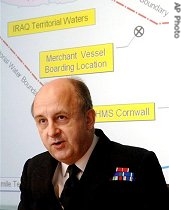2007年VOA标准英语-Boundary Dispute Seen as Root of Iranian Seizur(在线收听)
Washington
29 March 2007
Britain continues to insist that it was within Iraqi territorial waters when Iranian Revolutionary Guards seized two small patrol craft and 15 sailors and marines. Iran maintains the boats were in Iranian waters. As VOA correspondent Gary Thomas reports, the waters in question have long been a point of dispute between Iran and Iraq.
 |
| Vice Admiral Charles Style stands in front of a diagram depicitng when British soldiers were captured |
But as Craig Murray, former chief of the Maritime Section of Britain's Foreign and Commonwealth Office, points out, even the most sophisticated navigational devices are of no help in the current British-Iranian dispute because there is no clearly demarcated boundary.
"The major problem is, knowing where the ships were exactly doesn't help you know precisely where the boundary line is because that's what nobody really knows, because it [the boundary] has never been agreed," he explained.
The British boats were in the Persian Gulf outside the mouth of the Shatt-al-Arab waterway, a winding 193-kilometer tidal river that runs between Iran and Iraq. The waterway and the Gulf waters into which it flows have long been a source of conflict between the two neighbors. Control of it was one cause of the bloody Iran-Iraq War that ran from 1980 to 1988.
Kaiyan Kaikobad is a professor of international law at Durham University in Britain who has advised the United Nations and written extensively about Persian Gulf maritime disputes. He notes that Iran and Iraq have still not agreed on a formal maritime boundary in that area where the Shatt-al-Arab flows into the Gulf.
"Once you're in the Gulf, there is no lateral boundary that the two countries have agreed upon by virtue of a treaty," he said. "Now it may be that over these 15, 20, 25 years, they have a kind of de facto arrangement."
British troops operate out of Basra, the Iraqi port near the Gulf. Under U.N. mandate, Royal Navy ships patrol the coastal area of Iraq. Craig Murray, who also served as ambassador to Uzbekistan, says the shallow shipping lanes shift with tides and seasons, making even a rough demarcation extremely difficult.
British Foreign Office spokesman Barry Marston tells VOA that Britain realizes that there are questions about the maritime boundary in the area. But, he adds, the British craft were not in any area of dispute.
"We are aware there are some issue over in clarity over the Iraq-Iranian [demarcation], over the exact borderline along parts of that coast," he said. "That is an area, however, where there is no doubt whatsoever. This has never been a stretch where there has been any dispute over. So there's very, very little doubt that Britain is absolutely in the right here."
Kaiyan Kaikobad says that even if British craft had strayed into what Iran claims as its waters, under international law, Iran had no right to seize the sailors.
"Even if a naval vessel, a warship, from Iraq or from the United Kingdom strays into Iranian territory by mistake, even if that is the case, you can't arrest it," he said. "You can't board that craft. All that you do is you can ask that vessel, 'we want you to leave.' You can persevere in that. But you can't go about arresting them. You can't go about keeping their people in captivity."
U.S. warships are engaged in exercises in the Persian Gulf. Undersecretary of State Nicholas Burns said Thursday the maneuvers are not aimed at threatening Iran, but to make sure the Persian Gulf remains open to commerce.
"The message is, we have 170,000 American troops in Iraq, we have obvious security interests throughout the Gulf region. The Gulf is not an Iranian lake," he said. "It is an international waterway. And we will protect, as we have since the late 1940s, to protect the right of companies and nations to use the Gulf for international commerce."
Craig Murray thinks there is a simple solution to the current crisis, just have Iran and Iraq commit to negotiations on a maritime boundary.
"What they would say was, 'we acknowledge that these waters are disputed.' The British side would say, 'we thought we were in Iraqi territorial waters but we acknowledge there was a dispute and maybe Iran thought we were in their territorial waters, we had no intention of being in their territorial waters.' And both sides would say, 'we agree it would be a very good idea for Iran and Iraq to negotiate a boundary at an early date.' And then Iran could let the sailors go. That kind of agreement shouldn't ought to be difficult at all," he said.
British Prime Minister Tony Blair said Thursday Britain would not negotiate for the release of the detained service members, and again demanded their immediate and unconditional release.